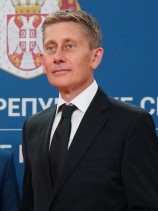
The Serbian Radical Party is a far-right, ultranationalist political party in Serbia. Founded in 1991, its co-founder, first and only leader is Vojislav Šešelj.

Tomislav Nikolić is a Serbian former politician who served as the president of Serbia from 2012 to 2017. A former member of the far-right Serbian Radical Party (SRS), he disassociated himself from the party in 2008 and formed the Serbian Progressive Party (SNS) which he led until 2012.
This article gives an overview of conservatism in Serbia. It is limited to conservative parties with substantial support, mainly proved by having had a representation in parliament. The sign ⇒ means a reference to another party in that scheme. For inclusion in this scheme it is not necessary so that parties labeled themselves as a conservative party.

As of 1 January 2011, Serbia no longer practices mandatory military service. Prior to this, mandatory military service lasted 6 months for men. Conscientious objectors could however opt for 9 months of civil service instead.

Aleksandar Vučić is a Serbian politician serving as the president of Serbia since 2017. A founding member of the Serbian Progressive Party (SNS), he previously served as the president of the SNS from 2012 to 2023, first deputy prime minister from 2012 to 2014, and prime minister of Serbia from 2014 to 2017.
Far-right politics in Serbia emerged shortly before the break-up of Yugoslavia and have been present ever since. Its manifestation mostly relies on national and religious factors.

The Serbian Progressive Party is a major populist, catch-all political party in Serbia. It has been the ruling party since 2012. Miloš Vučević, the incumbent prime minister of Serbia, has served as its president since 2023.

Parliamentary elections were held in Serbia on 6 May 2012 to elect members of the National Assembly. The elections were held simultaneously with provincial, local, and presidential elections.

The Serbian Movement Dveri, commonly just known as Dveri, is a nationalist and right-wing populist political party in Serbia. Its current president since 2024 is Ivan Kostić, who succeeded Boško Obradović, one of the co-founders of the party.

Parliamentary elections were held in Serbia on 24 April 2016. Initially, the election were originally due to be held by March 2018, but on 17 January 2016 Prime Minister Aleksandar Vučić called for a snap election claiming Serbia "needs four more years of stability so that it is ready to join the European Union". The elections were held simultaneously with provincial elections in Vojvodina and nationwide local elections.

Ivan B. Kostić is a Serbian politician. He has been the leader of the right-wing Dveri party since September 2024.

Aleksandar Martinović is a Serbian academic and politician. He has been a cabinet minister in the Serbian government since 2022 and is the current minister of agriculture, forestry, and water economy. Before his appointment to cabinet, he served several terms in the Serbian parliament.

Srđan Nogo is a Serbian politician. He was a prominent member of the right-wing Dveri party for several years until his expulsion in February 2019. In August 2020, he was arrested in Belgrade and charged with inciting sedition under article 309 of the Criminal Code of Serbia.
Marko Parezanović is a politician in Serbia. He has served in the National Assembly of Serbia since 2016 as a member of the Serbian Progressive Party.
Zoran Radojičić is a politician in Serbia. He was a member of the National Assembly of Serbia from 2016 to 2020, initially as a member of the right-wing Dveri party and subsequently as an independent.
Dragan Vesović is a politician in Serbia. He served in the National Assembly of Serbia from 2016 to 2020 as a member of the right-wing Dveri party.

Parliamentary elections were held in Serbia on 17 December 2023 to elect members of the National Assembly. While they were initially scheduled to be held by 30 April 2026, Aleksandar Vučić, the president of Serbia, called a snap election in November 2023. In addition to the parliamentary elections, the Vojvodina provincial and local elections were held in 65 cities and municipalities, including the capital, Belgrade.
Bratislav Jugović is a politician in Serbia. He has served in the municipal government of Čačak and was elected to the National Assembly of Serbia in the 2020 parliamentary election. At one time a leading member of the Movement of Socialists, Jugović is now a member of the Serbian Progressive Party.

General elections were held in Serbia on 3 April 2022 to elect both the president of Serbia and members of the National Assembly. Initially, parliamentary elections were scheduled to be held in 2024; however, in October 2020 president Aleksandar Vučić said that snap parliamentary elections would be held in or before April 2022. In addition to the general elections, local elections were held simultaneously in 12 municipalities and 2 cities, including Belgrade, the capital of Serbia.

National Gathering, initially known as the Serbian State-Building Bloc, was a far-right political coalition in Serbia, composed of Serbian Party Oathkeepers (SSZ) and Dveri. Formed in October 2023, the NO took part in the parliamentary, Vojvodina provincial, and Belgrade City Assembly elections, all of which were held on 17 December 2023.
















